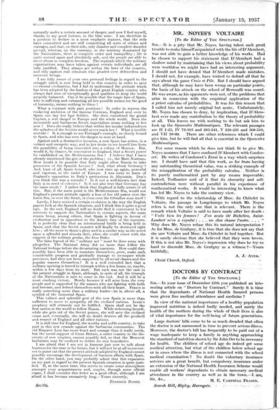- MR; . NOYES'S VOLTAIRE
[To the Editor of THE SPECTATOR.] SIR,—It is a pity that Mr. Noyes, having taken such great trouble to make himself acquaintedwith the life of D'Alembert, was not able to gain a better knowledge of his works. Hal he chosen to support his statement that D'Alembert had a shallow mind by maintaining that his views about probability were worthless we might have had an interesting argument. I should not have denied that D'Alembert made mistakes. I should not, for example, have wished to defend all that he says-about the game Croix et Pile. But I should have argued that, although he may have been wrong on particular points, the basis of his attack on the school of Bernoulli was sound. He was aware, as his opponents were not, of the problems that arise in connexion with the empirical application of the a priori calculus of probabilities. It was for this reason that I called him not merely original but acute. Unfortunately, Mr. Noyes has chosen to deny, by implication, that D'Alem- bert ever made any contribution to the theory of probability at all. This leaves me with nothing to do but ask him to look up the Opuscules Malhernaliques. The relevant passages are II 1-25, IV 73-105 and 283-341, V 228-231 and 508-510, and VII 39-60. There are other-references which I could give him, but he will find all that is essential in the Opuscules Mathematiques.
For some reason which he does not think fit to give Mr. Noyes assumes that I have confused D'Alembert with Condor- cet. He writes of Condorcet's Essai in a way which surprises me. I should have said that this work, so far from having any outstanding theoretical value, was a striking example of the misapplication of the probability calculus. Neither is its purely mathematical part by any means impeccable. Indeed, Todhunter said of it that its obscurity and self- contradiction were without parallel in his experience of mathematical works. It would be interesting to know what has led Mr. Noyes to take the contrary view.
With' regard to the relationship of -Mme. du Chiltelet to Voltaire, the passage hi Longehamps to which Mr. Noyes refers is not the only one that is relevant. There is the remark which Voltaire is said to have made- after her death : " Voila Bien les femmes ! J'en avais 'ate Richelieu, Saint- Lambert m'en a 'expulse ; . . . tin clou chasse l'autre. . . . " Why does Mr. Noyes refuse this its natural interpretation ? As for Mme. de Grafigny, it is true that she does not say that she saw Voltaire and Mme: du Chatelet in lied together. -But it is surely obvious that she believed that they were lovers. If this is not also Mr. Noyes's impression why does he try so hard to discredit Mme. • de Grafigny as a witness ?—Yours faithfully,










































 Previous page
Previous page